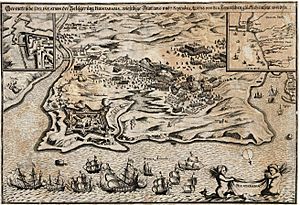Siege of Fuenterrabía (1638) facts for kids
Quick facts for kids Siege of Fuenterrabía |
|||||||
|---|---|---|---|---|---|---|---|
| Part of the Thirty Years' War and the Franco-Spanish War (1635-1659) |
|||||||
 Etching depicting the 1638 battle |
|||||||
|
|||||||
| Belligerents | |||||||
| Commanders and leaders | |||||||
| Strength | |||||||
| 18,000 infantry 2,000 cavalry 20–30 warships 7,000 sailors |
1,300 men (Hondarribia) 15,000 infantry 500 cavalry (Spanish Relief Army) |
||||||
| Casualties and losses | |||||||
| 4,000 dead or wounded 2,000 captured |
Unknown | ||||||
The Siege of Fuenterrabía was an important battle that happened in 1638. It was fought between the armies of Spain and France. This siege was part of two bigger conflicts: the Thirty Years' War and the Franco-Spanish War (1635-1659).
Contents
What Happened at Fuenterrabía?
The French army, led by generals like Henri de Bourbon, Bernard de La Valette, and Henri d'Escoubleau de Sourdis, surrounded the city of Fuenterrabía. They had a very large force, with about 27,000 soldiers and many warships.
The French Attack
The French army attacked the city for two months. They fired around 16,000 cannon shells into the walled city. This caused a lot of damage. The city was almost completely destroyed.
Despite the heavy attacks, the people inside Fuenterrabía refused to give up. Only about 300 people survived the siege, mostly women and children. Even with so few people left, the city did not surrender to the French.
Spanish Help Arrives
On September 7, 1638, a Spanish army arrived to help Fuenterrabía. This army was led by Juan Alfonso Enríquez de Cabrera. The Spanish forces fought the French army and defeated them. This victory lifted the siege and saved the city.
After the Battle
After the French lost at Fuenterrabía, there was some disagreement among their leaders. Henri de Sourdis tried to blame Bernard de La Valette for the defeat. La Valette had not wanted to lead the final attack because he thought it would fail.
For bravely resisting the French attack, the city of Fuenterrabía received a special title from the Spanish king. It was called "Muy noble, muy leal, muy valerosa y muy siempre fiel" (which means "Very noble, very loyal, very valiant, and very always faithful").
Remembering the Victory
The people of Fuenterrabía still remember this important victory today. Every year on September 8, they celebrate with a parade. This parade is known as the Alarde. It honors the brave people who defended their city in 1638.
See also
 In Spanish: Sitio de Fuenterrabía para niños
In Spanish: Sitio de Fuenterrabía para niños

